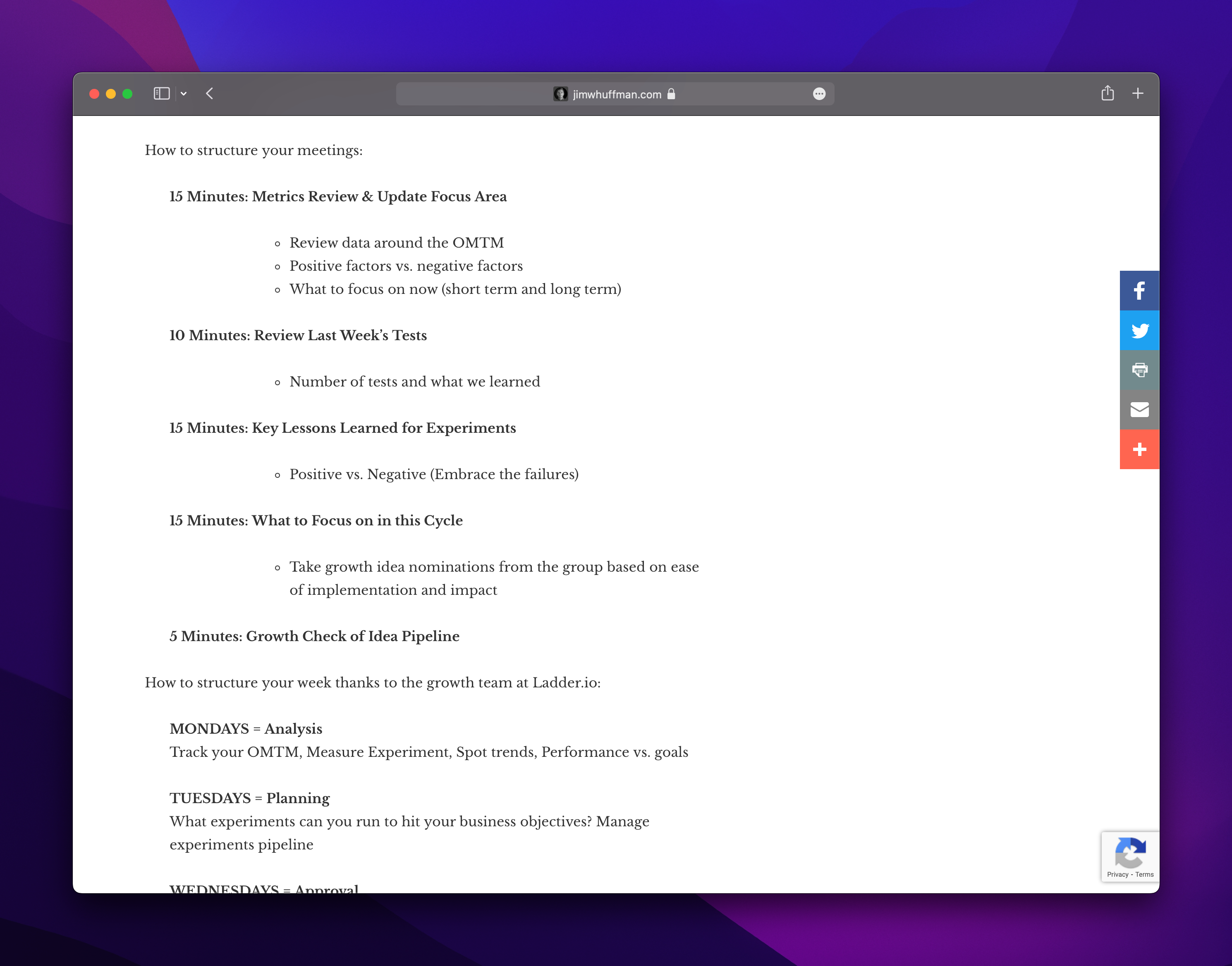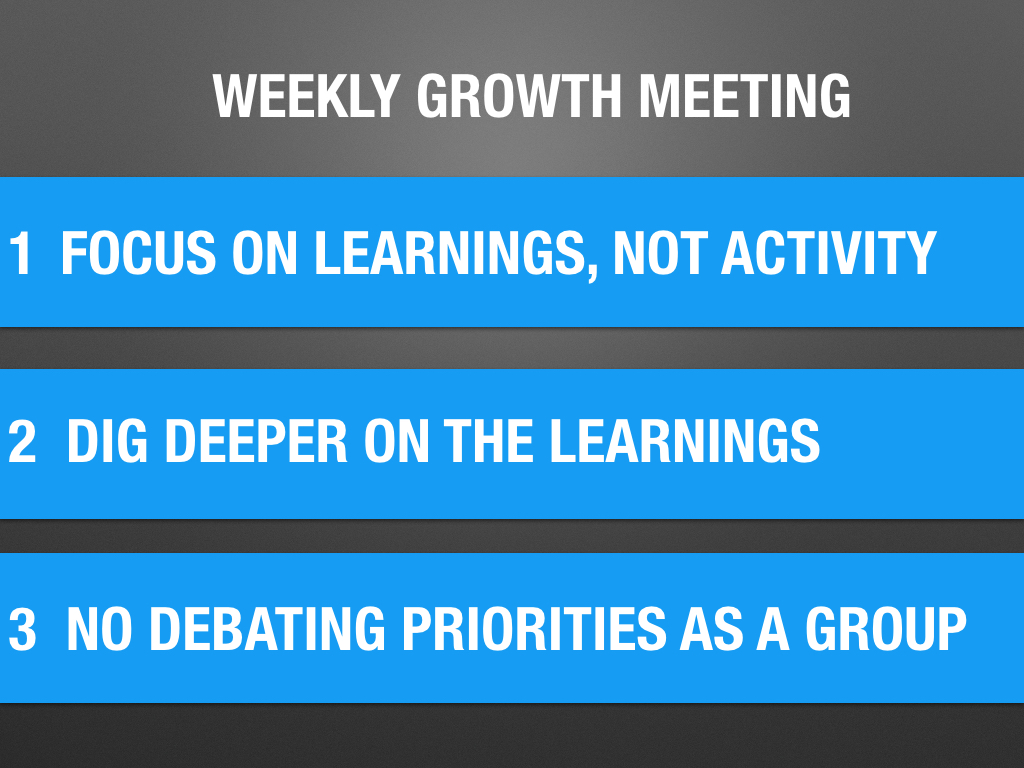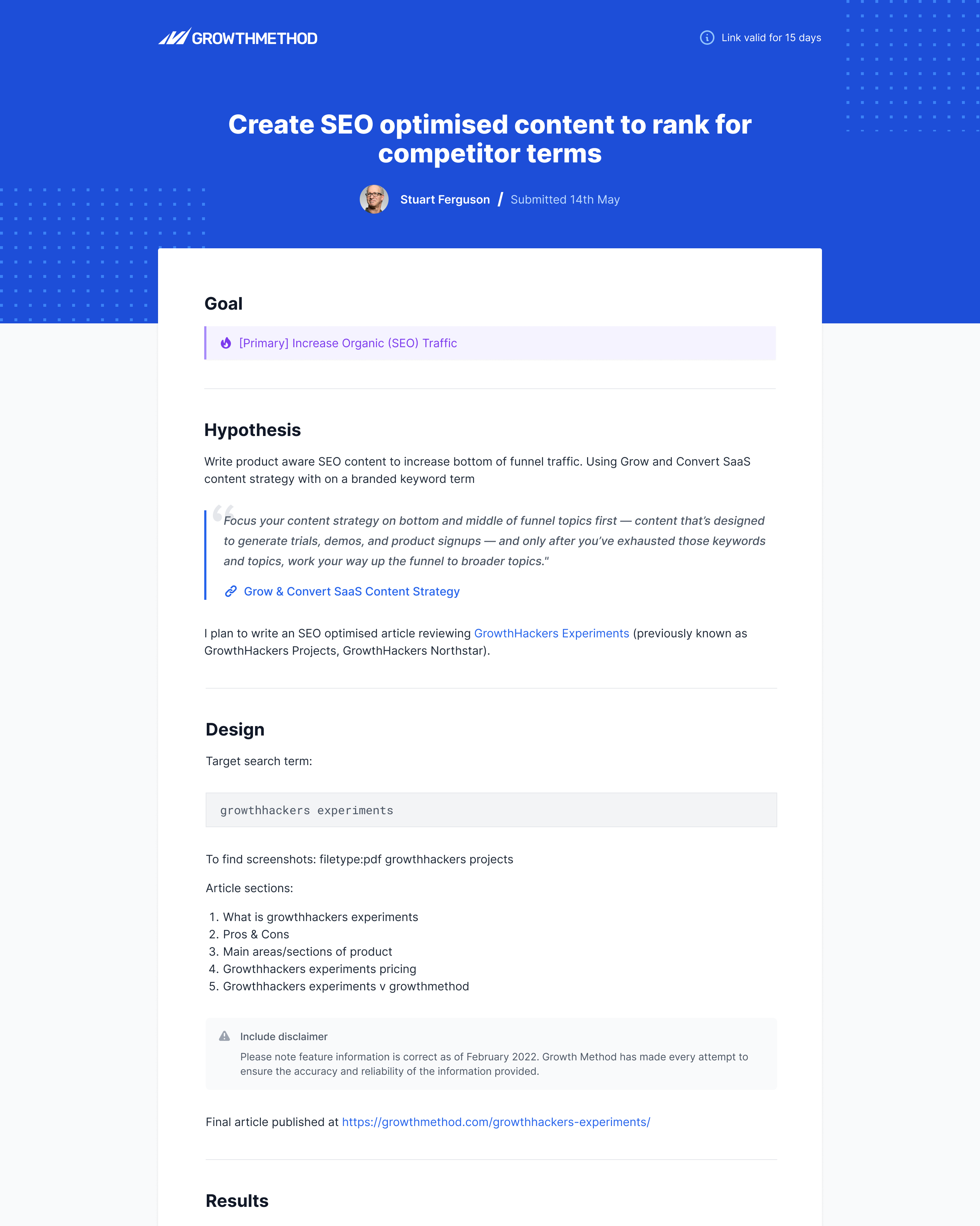How to run an effective growth team meeting
Article originally published in June 2019 by Stuart Brameld. Most recent update in August 2023.
Request a demo
Project management for growth and agile marketing professionals. Map your acquisition funnel, integrate analytics and run agile experiments.
Experiment results
Recent experiments results include competitor SEO, AI-driven content, exit-intent modals and AB testing homepage headlines.
Case study
"We are on-track to deliver a 43% increase in inbound leads this year. There is no doubt the adoption of Growth Method is the primary driver behind these results."
![]()
Certified
We are vetted mentors with Growth Mentor and a partner with the Agile Marketing Alliance.
The weekly growth team meeting is the most critical activity for ensuring you get results from your growth marketing process. However, the larger the team, the higher the cost opportunity cost of holding the meeting.

Bringing together a team of 5 people for a 60 minute meeting, with 15 minutes of disruption either side of the meeting, equates to 6 and a half hours of time that could be spent on other growth activities.
You need to run a tight ship.
Growth team meeting structures
Jim Huffman at Growth Hit suggest structuring growth team meetings as follows:
- 15 minutes: Metrics review & update focus area
- 10 minutes: Review last weeks tests
- 15 minutes: Key lessons learned
- 15 minutes: What to focus on in this cycle
- 5 minutes: Growth check of idea pipeline

Brian Balfour of growth training company Reforge suggests ensuring a focus on 3 main things:
- Focus on learnings, not activity
- Dig deeper on the learnings
- No debating priorities as a group

Over the year we have developed our own meeting agenda template (below) and encourage teams to use this document as a resource to develop their own.
Growth Method meeting agenda template
We recommend a weekly 45 to 60 minute discussion to review, prioritise, and plan experiments with the entire growth team. This is in addition to asynchronous check-ups and one-to-one meetings with individuals to discuss specific projects and experiments.
Use our recommended outline agenda below for your growth team meetings:
| Item | Minutes | Details | |
| 1 | Metrics Review | 5 | Check key growth metrics, KPIs or OKRs & the health of the idea backlog. |
| 2 | New Idea triage | 15 | Each person can nominate semi-formed ideas to “pitch” to the team in order to receive feedback from other growth team members. Once given a “green light” they can move forward to the experiment phase. |
| 3 | Learnings & Insights | 20 | The core of the growth team meeting is focused on learnings and insights, not on activities. Individuals should contribute learnings and findings from their experiments, as well and any implications for further actions. |
| 4 | Discussion Topics | 15 | Address any key themes, announcements or discussion topics. |
Pre-meeting expectations
The pre-meeting email should be sent automatically and include the meeting agenda and a summary of current experiments. It is reminder to ensure that team members come to the meeting knowing what is going on.
Every meeting starts with good preparation so set the expectation that everyone shows up to the meeting with an understanding of:
- The experiment pipeline and experiments in progress.
- Key business metrics and progress against objectives.
- Key learnings they would like to contribute to the meeting.
Focus on learnings and insights
High impact opportunities come from continually learning about your products & services, acquisition channels, prospects and customers, and testing ideas against those learnings. The growth meeting is the perfect opportunity to bring the learnings out into the open so that others can apply them in their work.
Growth meetings should focus on:
- How tests are impacting growth metrics
- Extracting and discussing lessons learned (consider using the 5 why’s)
- How lessons learned can be applied to new opportunities
- Making decisions on key issues or blockers
Team members bring fresh insights and perspectives on experiment outcomes and data, and ask questions that help the whole team to dig deeper and extract more from the work that is being done.
Growth team meeting best practises
Follow the best practises below to maximise the value of your growth meetings:
- Plan the meeting in advance and send automated reminders that include any prep required
- Maintain a consistent time, format, structure in order to build good habits for learning
- Keep meetings to between 45 and 60 minutes
- Make sure there is a meeting owner to facilitate and keep things on track
- Address bad behaviours quickly through 1-on-1 feedback
- Celebrate and reward impactful learnings
Growth meeting traps to avoid
Activity review
Avoid your weekly meetings becoming activity review sessions where individuals talk through everything they have done, and every experiment at every stage of the process is listed out and discussed. In general, meetings that focus on the “what” are both uninteresting and unproductive and there are more efficient ways to communicate this information (such as email or Slack notifications) that keep the team passively updated of any changes.
There are 2 ways to avoid this:
- Maintain a public growth marketing system that makes this information available to every member of the team at any time. If an individual needs or wants more details on a specific experiment, they can easily find this for themselves.
- Send automatic experiment updates (via email or to a Slack channel) to update team members of changes in real-time.
As experiment velocity increases, how well you learn from previous winners and losers affects the success rate of the next batch of experiments you run.
Unstructured brainstorming
Avoid unstructured brainstorming and ideation wherever possible. In general, some ad hoc discussion of ideas is fine however, avoid too much loosely structured brainstorming as this is not a productive use of time and should be taken offline.
Micro-level growth v macro-level growth
Avoid growth meetings that focus too much on micro-level growth (like the results of an individual A/B test) and that lose the focus of macro-level growth, like a larger MQL objective. With this is mind use the metrics review and automated reporting to ensure continual focus on core objectives.


